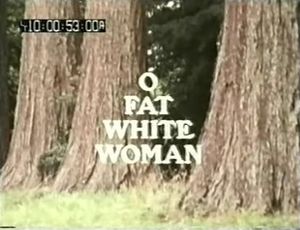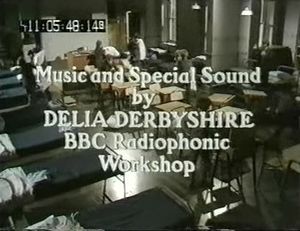O Fat White Woman
O Fat White Woman (1971)[1] is an 80-minute television play produced for the series Play For Today. The play was written by William Trevor and directed by Philip Saville.
I remember Delia very well. She created a wonderful music/sound to 'Oh Fat White Woman'
-- Philip Saville, personal communication
The title of the play is taken from Frances Cornford's poem:
To a Fat Lady Seen From the Train
O why do you walk through the fields in gloves,
Missing so much and so much?
O fat white woman whom nobody loves,
Why do you walk through the fields in gloves,
When the grass is soft as the breast of doves
And shivering sweet to the touch?
O why do you walk through the fields in gloves,
Missing so much and so much?
and the play is a “dark and unsettling drama focussed on the world of a sadistic Headmaster, his neglected wife, and the vulnerability of the children in his care...”[2] Delia created score and voice treatments using the Delaware synthesizer[3] and a review in The Guardian said that the play's tense narrative was “sharpened with Delia Derbyshire's radiophonic raw-nerve noises”[4]
Contents
Music tracks
The following tracks by Delia are used in the play (the names are invented by me):
- Wifty theme with "O Fat White Woman" poem) (0:48)
- Wifty theme with marching orders (0:39)
- Wifty theme (0:28)
- Wifty theme with Speed Bonny Boat (0:40)
- Chanting Latin verbs (1:25)
- Jolly Boating Weather (0:15)
- Dormitory theme (0:18)
- Dormitory theme with tooth brushing (0:17)
- Dormitory theme fragment (0:10)
- Marching, chanting, gossip, Perfect Love (1:33)
- Seeing double (1:13)
- Dormitory theme and seeing double (0:21)
- Seeing double, Raggett speaking to Mrs Digby Hunter (1:13)
- "Your husband takes pleasure from hurting people" (0:54)
- Raggett dies (0:19)
- Death knell (0:53)
- Death changes everything (0:49)
- Boys And Girls Come Out To Play (1:55)
An alternative analysis[2] identifies and gives names to six pieces forming this work:
- Title (03:25) (the four "Wifty theme" entries)
- Amo Amas Amat (01:29) ("Chanting Latin verbs")
- The Major's Perspective (06:26) ("Jolly Boating Weather" to "Dormitory theme and seeing double")
- Injury (02:52) ("Seeing double, Raggett speaking" to "Raggett dies")
- Consequences (01:59) ("Death knell" and "Death changes everything")
- End Credits (01:55) ("Boys and Girls")
Tapes
David Butler says of these:
The first tape runs to 21.15 minutes - but it's not music alas. The tape is a recording of a studio session: recording speech for a voice montage and presumably other voice-over sequences used in the production. The tape contains different takes, studio banter and direction from Philip Saville, the Cornford poem and some improvised random dialogue in French.
The second tape is the one where Delia comes in - it runs to 10.48 minutes and is principally made up of elements of speech from the studio recording but electronically treated to give them a non-naturalistic, subjective quality. The only music on this tape is some extremely brief fragments of slow organ music at the outset (and by brief I mean 9 seconds!) and then some brief organ chords punctuating the spoken word.[5]
Availability
- Broadcast by the BBC as Play For Today: 4 November 1971.
- An alternative version of the audio used to be downloadable from MediaFire containing an extra "long Amo Amas Abat" with other, unrelated music appended to it.
- File:Play for Today S2E04 O Fat White Woman (1971, William Trevor, Philip Saville, music by Delia Derbyshire).avi.torrent
- The Delian audio clips are included in the Delia Derbyshire Collection torrent.
 |
|
| Problems listening to this file? See media help. | |
 |
|
| Problems listening to this file? See media help. | |
 |
|
| Problems listening to this file? See media help. | |
 |
|
| Problems listening to this file? See media help. | |
 |
|
| Problems listening to this file? See media help. | |
 |
|
| Problems listening to this file? See media help. | |
 |
|
| Problems listening to this file? See media help. | |
 |
|
| Problems listening to this file? See media help. | |
References
- ↑ O Fat White Woman on imdb.com
- ↑ 2.0 2.1 O Fat White Woman at the Electronic Church of St Delia on facebook.com
- ↑ Special Sound, p.140.
- ↑ From Peter Fiddick's article "Trevor Play" in The Guardian on 5th November 1971, cited in Special Sound, p.140.
- ↑ Personal communication, 1st April 2009

